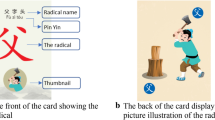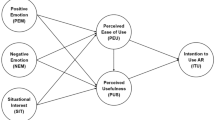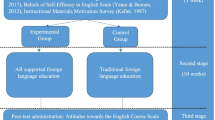Abstract
Some research shows that affective state of learners is not less important for didactic effectiveness than their cognitive state. This paper describes an attempt to stimulate some affective states in order to boost a didactic process quality by using augmented reality systems as a stimuli. Results of some research about AR effectiveness in didactic process were analyzed, and they show that augmented reality as it is isn’t sufficient to entail and preserve adequate affective states in pupils. Subsequently, there were shown examples AR applications that stimulate specific affective states crucial for optimal didactic process. Some Augmented Reality application mechanisms were suggested, that corresponds with those affective states beneficial for didactics optimization. Finally, users of those applications were examined, and the results were analyzed in order to suggest a guidelines for designing AR applications, which by using affective stimulation are best suited for didactic process.
Access this chapter
Tax calculation will be finalised at checkout
Purchases are for personal use only
Preview
Unable to display preview. Download preview PDF.
Similar content being viewed by others
References
Kurzweil, R.: The Age of Spiritual Machines. Viking Press (1999)
Craft, A.: Creativity and Education Futures: Learning in a Digital Age. Trentham Books Ltd. (2010)
Yerkes, R.M., Dodson, J.D.: The relation of strength of stimulus to rapidity of habit-formation (1908)
Diamond, D.M., Campbell, A.M., Park, C.R., Halonen, J., Zoladz, P.R.: The Temporal Dynamics Model of Emotional Memory Processing: A Synthesis on the Neurobiological Basis of Stress-Induced Amnesia, Flashbulb and Traumatic Memories, and the Yerkes-Dodson Law, 28 March 2007
Fredrickson, B.: What good are positive emotions? Journal of General Psychology 2(3) (1998)
Panteva, P., Ivanowa, M.: Exploration on the Affective States and Learning During an Augmented Reality Session. JADLET Journal of Advanced Distributed Learning Technology (2013)
Mehrabian, A.: Pleasure-Arousal-Dominance: a general framework for describing and measuring individual differences in temperament. Current Psychology 14 (1996)
Ratneshwar, S., Mick, D.G.: The why of consumption: contemporary perspectives on consumer motives (2003)
Russel, J.A.: A circumplex model of affect. Journal of Personality and Social Psychology (1980)
Russell, J.A., Lewicka M., Niit, T.: A cross-cultural study of a circumplex model of affect. Journal of Personality and Social Psychology (1989)
Posner, J., Russell, J.A., Peterson, B.S.: The circumplex model of affect: An integrative approach to affective neuroscience, cognitive development, and psychopathology. Development and Psychopathology 17(3) (2005)
Author information
Authors and Affiliations
Corresponding author
Editor information
Editors and Affiliations
Rights and permissions
Copyright information
© 2015 Springer International Publishing Switzerland
About this paper
Cite this paper
Hrebieniuk, P., Wantuła, Z. (2015). Maximization of AR Effectiveness as a Didactic Tool with Affective States Recognition. In: Nguyen, N., Trawiński, B., Kosala, R. (eds) Intelligent Information and Database Systems. ACIIDS 2015. Lecture Notes in Computer Science(), vol 9012. Springer, Cham. https://doi.org/10.1007/978-3-319-15705-4_36
Download citation
DOI: https://doi.org/10.1007/978-3-319-15705-4_36
Published:
Publisher Name: Springer, Cham
Print ISBN: 978-3-319-15704-7
Online ISBN: 978-3-319-15705-4
eBook Packages: Computer ScienceComputer Science (R0)




